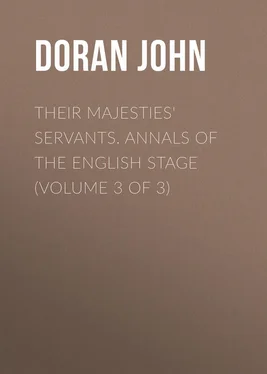John Doran - Their Majesties' Servants. Annals of the English Stage (Volume 3 of 3)
Здесь есть возможность читать онлайн «John Doran - Their Majesties' Servants. Annals of the English Stage (Volume 3 of 3)» — ознакомительный отрывок электронной книги совершенно бесплатно, а после прочтения отрывка купить полную версию. В некоторых случаях можно слушать аудио, скачать через торрент в формате fb2 и присутствует краткое содержание. Издательство: Иностранный паблик, Жанр: foreign_antique, foreign_prose, на английском языке. Описание произведения, (предисловие) а так же отзывы посетителей доступны на портале библиотеки ЛибКат.
- Название:Their Majesties' Servants. Annals of the English Stage (Volume 3 of 3)
- Автор:
- Издательство:Иностранный паблик
- Жанр:
- Год:неизвестен
- ISBN:нет данных
- Рейтинг книги:3 / 5. Голосов: 1
-
Избранное:Добавить в избранное
- Отзывы:
-
Ваша оценка:
- 60
- 1
- 2
- 3
- 4
- 5
Their Majesties' Servants. Annals of the English Stage (Volume 3 of 3): краткое содержание, описание и аннотация
Предлагаем к чтению аннотацию, описание, краткое содержание или предисловие (зависит от того, что написал сам автор книги «Their Majesties' Servants. Annals of the English Stage (Volume 3 of 3)»). Если вы не нашли необходимую информацию о книге — напишите в комментариях, мы постараемся отыскать её.
Their Majesties' Servants. Annals of the English Stage (Volume 3 of 3) — читать онлайн ознакомительный отрывок
Ниже представлен текст книги, разбитый по страницам. Система сохранения места последней прочитанной страницы, позволяет с удобством читать онлайн бесплатно книгу «Their Majesties' Servants. Annals of the English Stage (Volume 3 of 3)», без необходимости каждый раз заново искать на чём Вы остановились. Поставьте закладку, и сможете в любой момент перейти на страницу, на которой закончили чтение.
Интервал:
Закладка:
Dr. Doran
«Their Majesties' Servants.» Annals of the English Stage (Volume 3 of 3)
CHAPTER I
OF AUTHORS, AND PARTICULARLY OF CONDEMNED AUTHORS
A glance at the foregoing list 1 1 Vol. ii., pp. 398-406.
will serve to show that, from the retirement of Garrick to the close of the eighteenth century, tragic literature made no progress. It retrograded. It did not even reach the height of Fenton and Hughes, in whom Walpole discerned some faint sparkling of the merit of the older masters. After Shakspeare's time, "Theatric genius," says Walpole, "lay dormant;" but he adds, that "it waked with some bold and glorious, but irregular and often ridiculous flights, in Dryden; revived in Otway; maintained a placid, pleasing kind of dignity in Rowe, and even shone in 'Jane Shore.' It trod in sublime and classic fetters in 'Cato;' but was void of nature, or the power of affecting the passions. In Southerne it seemed a genuine ray of nature and Shakspeare, but falling on an age still more Hottentot, was stifled in those gross and barbarous productions, tragi-comedies. It turned to tuneful nonsense in the 'Mourning Bride;' grew stark mad in Lee, whose cloak, a little the worse for wear, fell on Young, yet in both was still a poet's cloak. It recovered its senses in Hughes and Fenton, who were afraid it should relapse, and accordingly kept it down with a timid, but amiable, hand; and then it languished."
And continued to languish; I cannot more fully show to what extent, than by remarking that the century which opened with Rowe concluded with Pye – both Poets Laureate, but of different qualities. "Tamerlane" and "Jane Shore" have not yet dropped from the list of acting plays; but who knows anything more of "Adelaide" than that it was insipid, possessed not even a "tuneful nonsense," and was only distinguished for having made Mrs. Siddons and John Kemble appear almost as insipid as the play. Godwin's "Antonio," played in 1800, was as complete a failure as Pye's "Adelaide."
For the tragic poets who occupy the period between Garrick's retirement and the coming of Pye and Godwin, a few words will suffice. Mason's "Caractacus" was a noble effort, but it produced less effect than D'Egville's ballet on the same subject in the succeeding century. Cumberland's "Battle of Hastings" was as near Shakspeare as Ireland's "Vortigern" was; and Home's "Alfred" died, three days old.
Jephson was, after all, the favourite playwright of Walpole, who says of his "Law of Lombardy," that it was even "too rich" in language! but then Jephson always improved the passages to which Walpole objected. Walpole gave orders for alterations in Jephson's plays, as he might for the repairs of a cabinet. Sometimes his criticism is excellent, and at others, it involves a social illustration, as in that on the "Count of Narbonne." Raymond, in the last scene, says, "Show me thy wound; oh, hell! 'tis through her heart!" "This line," says Walpole, "is quite unnecessary, and infers an obedience in displaying her wound, which would be shocking; besides, as there is often a buffoon in an audience, at a new tragedy, it might be received dangerously. The word 'Jehovah!' will certainly not be suffered on the stage." Walpole praises Miss Younge's acting, and says, "the applause to one of her speeches lasted a minute, and recommenced twice before the play could go on." Jephson, however, wrote fair acting pieces, which is more than can be said for Bentley's "Philodamus," which, in spite of being pronounced by Gray the best dramatic poem in the language, 2 2 "One of the most capital poems in the English language" is what Gray is reported to have said.
was hilariously laughed off the stage. It was at least original, which can hardly be said of any of Cumberland's plays, except the "Carmelite," a tragedy that terminates merrily! Cumberland was as much out of his line in tragedy as Reynolds, whose "Werter" and "Eloisa" brought him eight pounds!
"And very good pay too, sir!" said Macklin, "so go home, and write two more tragedies, and if you gain £4 by each of them, why, young man! the author of Paradise Lost will be a fool to you!"
Hayley, of whom Walpole said, "That sot Boswell is a classic in comparison;" and Murphy, with undeniable powers, failed in their attempts at tragedy during this period. Boaden may be said to have been below the level of Pye himself. On the former's "Aurelio and Miranda" some criticism was made before it was acted. The author was reading his play to the actors, when he remarked, that he knew nothing so terrible as having to read it before so critical an audience. "Oh, yes!" exclaimed Mrs. Powell, "there is something much more terrible." "What can that be?" asked Boaden foolishly. "To be obliged to sit and hear it," was the reply of Lady Emma Hamilton's old fellow-servant.
But if tragedy languished miserably, comedy was vivacious and triumphant. This period gave us the "School for Scandal," perhaps the most faultless comedy of the whole century. It gave us Murphy's "Know your own Mind;" the "Critic," that admirable offspring of the "Rehearsal;" Macklin's "Man of the World," the most muscular of comedies, which contrasts so forcibly with the sketchy sentimental, yet not nerveless comedies of Holcroft; General Burgoyne's "Heiress," which is not only superior to General Conway's "False Appearances" (a translation from a comedy by Boissy), but is, perhaps, the second best comedy of the period; Cumberland's "Jew" and "Wheel of Fortune;" Colman's serio-comic "Mountaineers," and the rattling "five-act farces" of Reynolds. At the head of all these, and of many others, stood Sheridan's immortal comedy. He may, as he said, have spoiled Vanbrugh's "Relapse," in converting it into the "Trip to Scarborough;" but the "School for Scandal" 3 3 Produced 8th May 1777.
has been accepted as the best comedy of the English stage. In its dazzling brilliancy, the labour expended to effect it is all forgotten. Garrick took the greatest interest in its success, and when a flatterer remarked to him that its popularity would only be ephemeral, and that with Garrick himself the Atlas of the stage had departed, the latter calmly replied that, in Mr. Sheridan, his successor in the management, the stage had a Hercules equal to any labour it might require at his hands.
I turn, less to newspapers than to private contemporary sources, to see what was thought of this comedy on its first appearance. Walpole was present at the acting, and he says: "To my great astonishment, there were more parts performed admirably in the 'School for Scandal,' than I almost ever saw in any play. Mrs. Abington was equal to the first of her profession; Yates, Parsons, Miss Pope and Palmer, all shone. It seemed a marvellous resurrection of the stage. Indeed, the play had as much merit as the actors. I have seen no comedy that comes near it, since the 'Provoked Husband.'" The chief characters were thus represented: Sir Peter, King; Sir Oliver, Yates; Backbite, Dodd; Charles Surface, Smith; Joseph Surface, Palmer; Crabtree, Parsons; Lady Teazle, Mrs. Abington; Mrs. Candour, Miss Pope; and Maria, by Miss P. Hopkins, daughter of the prompter, – soon to be the wife of Brereton, and subsequently that of John Kemble.
Walpole objected, that the comedy was too long, despite great wit and good situations; and that there were two or three bad scenes that might be easily omitted, and which, to his thinking, wanted truth of character. He does not specify the scenes, and he acknowledges that he had not read the play, and that he "sat too high to hear it well." When he had read it, he came to the conclusion that it was "rapid and lively, but far from containing the wit he had expected, on seeing it acted."
To Walpole, the "Heiress," by Burgoyne, was "the genteelest comedy" in the English language. Of Macklin's "Man of the World," the same writer says: – "Boswell pretended to like it, which would almost make one suspect that he knows a dose of poison had already been administered; though, by the way, I hear there is little good in the piece, except the likeness of Sir Pertinax to twenty thousand Scots."
Читать дальшеИнтервал:
Закладка:
Похожие книги на «Their Majesties' Servants. Annals of the English Stage (Volume 3 of 3)»
Представляем Вашему вниманию похожие книги на «Their Majesties' Servants. Annals of the English Stage (Volume 3 of 3)» списком для выбора. Мы отобрали схожую по названию и смыслу литературу в надежде предоставить читателям больше вариантов отыскать новые, интересные, ещё непрочитанные произведения.
Обсуждение, отзывы о книге «Their Majesties' Servants. Annals of the English Stage (Volume 3 of 3)» и просто собственные мнения читателей. Оставьте ваши комментарии, напишите, что Вы думаете о произведении, его смысле или главных героях. Укажите что конкретно понравилось, а что нет, и почему Вы так считаете.












